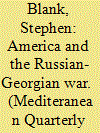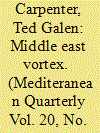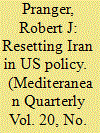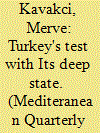| Srl | Item |
| 1 |
ID:
092962


|
|
|
|
|
| Publication |
2009.
|
| Summary/Abstract |
This article analyzes the consequences of the 2008 Russian-Georgian war and the unfocused US response to that war. It describes the negative tendencies in both Russian behavior and European security that were illuminated by the war, and concludes that the West, including the United States, suffered serious geopolitical defeats, with consequences that have not yet been remedied or overcome. Therefore, the West's security situation vis-à-vis Russia and Central Eurasia remains fraught with potential serious dangers.
|
|
|
|
|
|
|
|
|
|
|
|
|
|
|
|
| 2 |
ID:
092961


|
|
|
|
|
| Publication |
2009.
|
| Summary/Abstract |
The United States seems committed to withdrawing its forces from Iraq by the end of 2011. Experts worry that the relative calm since mid-2007 might not last once US troops depart. Indeed, there are serious questions about whether Iraq can be a viable state in the long run. If Iraq becomes a cockpit of instability, as it was during the first four years following the US invasion, the implications for the region are ominous. Unfortunately, the factors that cause turbulence, including Kurdish secessionist aspirations and simmering Sunni-Shiite tensions, are largely beyond the control of the United States.
|
|
|
|
|
|
|
|
|
|
|
|
|
|
|
|
| 3 |
ID:
092958


|
|
|
|
|
| Publication |
2009.
|
| Summary/Abstract |
The author places American politics in historical and philosophical context, reflecting on the significance of the election of the first African American as president of the United States. He raises fundamental questions about the dearth of historical change and the ability of the system to co-opt change, render it irrelevant in the long run, and maintain the status quo.
|
|
|
|
|
|
|
|
|
|
|
|
|
|
|
|
| 4 |
ID:
092960


|
|
|
|
|
| Publication |
2009.
|
| Summary/Abstract |
The Obama administration seems to have given considerable attention to the diplomatic idea of resetting various areas of US foreign policy. As Iran and Israel move toward possible war over regional hegemony with each other-a conflict that looms sooner rather than later-nuclear capability provides leverage for both powers. It is incumbent on the United States to intervene as a third-power mediator, rather than as leader of sanctions against Iran, in order to maintain a stable balance of power in the Middle East. This position would represent a genuine resetting of US foreign policy.
|
|
|
|
|
|
|
|
|
|
|
|
|
|
|
|
| 5 |
ID:
092966


|
|
|
|
|
| Publication |
2009.
|
| Summary/Abstract |
Foreign policy capacity is defined as dynamic, information-based adaptation by nation-states in complex, ambiguous environments that involve their domestic systems as well as external variables. On questions of Bosnia and Kosovo, Serbia's policy capacity is weakened by lack of domestic consensus on whether Belgrade should embrace East or West on Balkan security issues. Nonalignment may be one way out of this dilemma; a second avenue might be a stronger role for the Contact Group comprising the United States, Russia, and key European Union countries. A continued policy of drift at the mercy of events seems risky for Serbia over the longer term.
|
|
|
|
|
|
|
|
|
|
|
|
|
|
|
|
| 6 |
ID:
092968


|
|
|
|
|
| Publication |
2009.
|
| Summary/Abstract |
Modern Turkey is experiencing one of its most defining moments since its inception. If the passage from one-party system to multiparty system in 1940 was one such turning point and if the period of Turgut Ozal's governance, which gave the country access to the international market for the first time, was a second, then the recent developments concerning Ergenekon, a layer of an undiscovered world of the Turkish deep state, is the third of its kind. Until almost the end of the 1990s, most Turks were oblivious to the somewhat enigmatic concept of a state within a state. In the days of discussion following the coup d'état of 1997, then-president Suleyman Demirel pointed out that the Turkish military was the deep state. Twelve years after Demirel's concession, observers know that the deep state goes beyond certain factions within the Turkish military and percolates into various facets of the state machinery. This article sheds light on the organization of the deep state, some of the underlying reasons behind its emergence, and its activities affecting the country's course of democratization or lack thereof. It argues that with the recent efforts of deconstructing the deep state, Turkey has ushered in a new era of democratization.
|
|
|
|
|
|
|
|
|
|
|
|
|
|
|
|
| 7 |
ID:
092964


|
|
|
|
|
| Publication |
2009.
|
| Summary/Abstract |
This article assesses early twenty-first-century dynamics in the Mediterranean area as indications of the limited success of countries in the region to integrate further into the emerging international system.
Successive attempts to enhance regional and subregional dynamics across the Mediterranean have remained in an embryonic stage at best. A review of foreign policy priorities of the riparian states reveals a divergence in agenda setting, with either EU membership or subregional affairs dominating the foreign policy strategic planning. There is little to indicate that an intensification of trans-Mediterranean regional dynamics is taking place.
Until France officially took the initiative to promote the Union for the Mediterranean initiative in 2008, interest was waning in the Euro-Mediterranean Partnership that was launched in November 1995. The Union for the Mediterranean offers the blueprint to address the physical architectural deficit that has prevented the Mediterranean area from becoming a coherent, functional economic regional space.
|
|
|
|
|
|
|
|
|
|
|
|
|
|
|
|